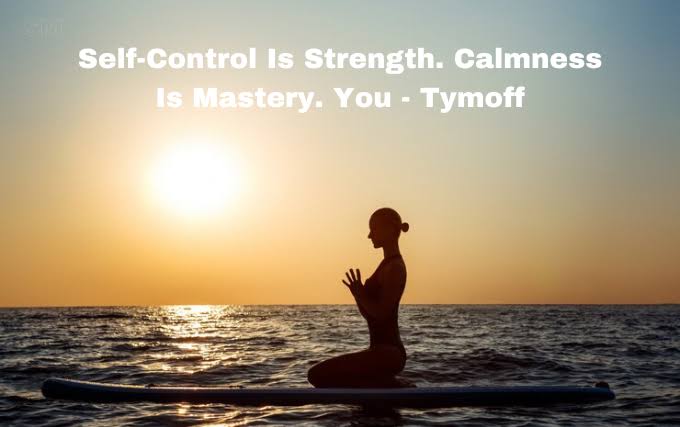Self-Control is Strength. Calmness is Mastery. You – Tymoff

In a world that often feels chaotic and unpredictable, the ability to remain grounded and composed is invaluable. The quote “Self-control is strength. Calmness is mastery. You – Tymoff” encapsulates the essence of personal power and emotional intelligence. These two qualities—self-control and calmness—are not only essential for success but also for cultivating inner peace and resilience.
Self-Control: The Core of Inner Strength
Self-control is more than just a skill; it is the bedrock of personal strength. It enables us to manage our impulses, control our desires, and make thoughtful decisions that align with our long-term goals. In a society that encourages instant gratification, exercising self-control is a mark of mental and emotional toughness.
People who exhibit self-control are better equipped to face challenges and resist the distractions that can derail them from their path. Whether it’s staying committed to a health regimen, avoiding negative habits, or managing difficult emotions, self-control helps us stay focused on what truly matters. It’s this discipline that Tymoff emphasizes as strength—the ability to withstand temptation and maintain course, regardless of external pressures.
Self-control, in its essence, gives us the power to take control of our lives. It prevents us from being swayed by fleeting impulses and helps us focus on what brings long-term fulfillment. This makes it one of the most vital traits for achieving success in any area of life.
Calmness: The Key to Mastery
The second part of the quote, “Calmness is mastery,” speaks to the wisdom of maintaining composure in the face of adversity. Calmness is not about suppressing emotions, but about regulating them in a way that promotes clear thinking and rational decision-making. It is the ability to remain centered even when circumstances are turbulent.
When we cultivate calmness, we master not only our emotions but also our responses to external situations. Life will inevitably present us with stress, conflict, and uncertainty, but those who have mastered the art of calmness are able to navigate these challenges with grace. In moments of crisis, calmness allows us to think clearly, respond effectively, and maintain a sense of control.
A calm mind also fosters better relationships. When we are calm, we communicate more effectively, listen more attentively, and are less likely to be reactive. This emotional stability can be a source of strength for others, making calmness a key trait in leadership and teamwork.
The Role of “You” in Personal Growth
The final word of the quote, “You,” brings the focus back to the individual. It’s a reminder that self-control and calmness are personal responsibilities. No one can cultivate these qualities for you. It’s a personal journey of self-mastery, one that requires commitment, self-reflection, and practice.
The power of “you” lies in the choices you make every day. When faced with a difficult situation, it’s up to you to choose calm over chaos, self-control over impulsivity. These small decisions accumulate over time, shaping your character and determining your success.
How to Develop Self-Control and Calmness
Building self-control and calmness is not an overnight transformation, but a gradual process. Here are some practical steps to help develop these traits:
- Practice Mindfulness: Mindfulness allows you to be present in the moment and observe your thoughts and emotions without judgment. This awareness helps in regulating impulses and fosters a sense of calm.
- Set Clear Goals: When you have a clear vision of what you want to achieve, it becomes easier to exercise self-control. Focus on your long-term goals rather than short-term temptations.
- Develop Patience: Patience is key to both self-control and calmness. Learn to tolerate discomfort and delays without losing your cool or giving in to frustration.
- Breathing Techniques: Deep breathing exercises can help calm your mind and body during stressful situations. This simple yet effective tool can prevent you from reacting impulsively.
- Self-Reflection: Take time to reflect on your actions and emotions. This practice helps you recognize patterns and triggers, making it easier to exercise self-control and maintain calmness in future situations.
Read also: Mary Joan Martelly: The Woman Behind the Champion and a Force for Change
Conclusion
“Self-control is strength. Calmness is mastery. You – Tymoff” encapsulates the wisdom of emotional resilience and personal growth. By developing self-control, we gain the strength to overcome challenges and stay true to our goals. Through calmness, we achieve mastery over our emotions, enabling us to respond wisely to life’s complexities. The journey to becoming a stronger, more composed individual begins with you. The choices you make today set the foundation for a life of strength, peace, and fulfillment.



